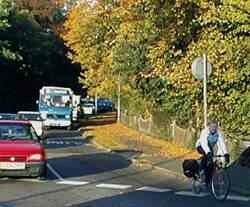 Many journeys to work are ideal for cycling. If you live a reasonable distance from work (up to about five miles), you might find it possible to cycle - even just once a week.
Many journeys to work are ideal for cycling. If you live a reasonable distance from work (up to about five miles), you might find it possible to cycle - even just once a week.
Why cycle to work?
Cycling is a great way of getting exercise - the British Medical Association says the health benefits far outweight any risks. And you don't have to go anywhere special to do it -you can get fit as part of your everyday routine.
Cycling can be fun - you can enjoy being outdoors without the stresses of driving - and less stress helps you work more effectively. If the weather changes, good waterproofs will prevent you getting soaked on the way home.
Cycling saves money - no petrol costs, no need for a second family car, no worries about parking charges. For employers and government, more cyclists mean less congestion to hold up public transport and commercial traffic.
Cycling is good for the environment - by cycling occasionally, you can reduce your contribution to local pollution, to global warming, and to the traffic-related health problems that affect more and more people.
Overcoming problems - Cycling is not always a suitable commuter option, but some problems can be overcome. Could you combine journeys when you have the car so you are free to cycle once a week? What about trying the school run by bike?
Employers can help by installing high quality facilities such as cycle racks, showers and lockers. They can support training for novice cyclists, promote a weekly 'casual' day for those who don't want to crease their best clothes, and reassure parents by guaranteeing to cover taxi fares in an emergency. Appointing a 'cycle co-ordinator' in the workplace is a good way to start discussions about what facilities are needed.
The above contribution is from Dr Paul Rosen, Science & Technology Studies Unit, University of York Author of Framing Production: Technology, Culture and Change in the British Bicycle Industry (MIT Press, 2002).